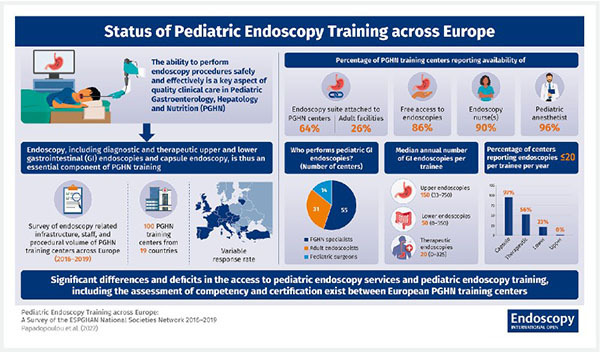- Record: found
- Abstract: found
- Article: found
Pediatric endoscopy training across Europe: a survey of the ESPGHAN National Societies Network 2016–2019

Read this article at
Abstract
Background and study aims The ability to perform endoscopy procedures safely and effectively is a key aspect of quality clinical care in Pediatric Gastroenterology, Hepatology and Nutrition (PGHN). The aim of this survey, which was part of a global survey on PGHN training in Europe, was to assess endoscopy training opportunities provided across Europe.
Methods Responses to standardized questions related to endoscopy training were collected from training centers across Europe through the presidents/representatives of the European Society for Paediatric Gastroenterology, Hepatology and Nutrition National Societies from June 2016 to December 2019.
Results A total of 100 training centers from 19 countries participated in the survey. In 57 centers, the endoscopy suit was attached to the PGHN center, while in 23, pediatric endoscopies were performed in adult endoscopy facilities. Ninety percent of centers reported the availability of specialized endoscopy nurses and 96 % of pediatric anesthetists. Pediatric endoscopies were performed by PGHN specialists in 55 centers, while 31 centers reported the involvement of an adult endoscopist and 14 of a pediatric surgeon. Dividing the number of procedures performed at the training center by the number of trainees, ≤ 20 upper, lower, or therapeutic endoscopies per trainee per year were reported by 0 %, 23 %, and 56 % of centers, respectively, whereas ≤ 5 wireless capsule endoscopies per trainee per year by 75 %. Only one country (United Kingdom) required separate certification of competency in endoscopy.
Conclusions Differences and deficiencies in infrastructure, staffing, and procedural volume, as well as in endoscopy competency assessment and certification, were identified among European PGHN training centers limiting training opportunities in pediatric endoscopy.
Abstract

Related collections
Most cited references29
- Record: found
- Abstract: not found
- Article: not found
Assessment in medical education.
- Record: found
- Abstract: found
- Article: not found
Paediatric Gastrointestinal Endoscopy: European Society for Paediatric Gastroenterology Hepatology and Nutrition and European Society of Gastrointestinal Endoscopy Guidelines.
- Record: found
- Abstract: not found
- Article: not found